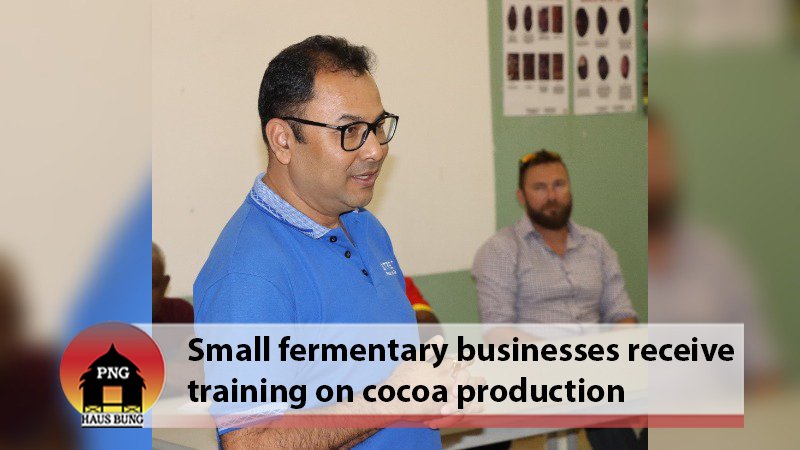The Greater Sepik region of Papua New Guinea is leading area in cocoa production in the country, but quality has been a concern compared to other cocoa producing provinces.
To address this quality issue, the FAO-led EU-STREIT PNG Programme in collaboration with the PNG Cocoa Board organised a series of capacity building trainings for small fermentary business owners in East Sepik and Sandaun provinces.
The weeklong workshops were intensive and conducted simultaneously over five weeks in August and September 2022 in eight different districts of East Sepik and Sandaun provinces namely Angoram, Yangoru-Saussia, Wewak, Maprik, Wosera-Gawi, Ambunti-Drekikier, Nuku, and Aitape-Lumi.
A total of 470 participants including some model farmers were taken through Cocoa Act 1981, Cocoa Inspection Regulations, requirements for registration of cocoa fermentaries, PNG export standards, and different agencies involved in the cocoa industry.
The cocoa business actors were also trained on proper cocoa drying and fermentation processes, including how to break cocoa pods, and quality management skills.
Group discussions with field visits to model cocoa blocks and small fermentary set-ups and exporters’ processing facilities were part of these weeklong trainings.
While opening the session in Wewak, the EU-STREIT Deputy Programme Coordinator Dr Pavel Burian said: “As a fermentary owner, you have crucial roles to play in the value chain to ensure quality beans are exported for an improved financial return for your business as well as for cocoa farmers to improve their livelihoods in a more sustainable way.”
“It is everyone’s responsibility to ensure quality beans that are exported for higher financial returns for processing as well as to benefit smallholder farmers with better incentive. After this training, you learn how to process your beans properly, but the beans from other fermentary owners who didn’t get this opportunity will be mixed with yours for export, so it is important to share this knowledge with others to maintain uniform quality for holistic benefit” explained the Programme’s Senior Agricultural Officer, Dr Rabi Rasaily, while closing the training held for Aitape cocoa businesspersons.
Facilitating these set of trainings were three female and three national male experts from the Quality Section of the Cocoa Board Head Office in Kokopo, East New Britain Province.
Mr Daryll Worimo, the PNG Cocoa Board Regional Manager for Sepik, also emphasised: “the aim of these trainings is to address the quality issues experienced at the farmers and fermentary owners’ levels. With these trainings, we found that many participants are very happy and understand the importance of quality.”
For the participants, the opportunity has set them well to improve on their practices. “As fermentary owners I think we now know what to do because the training was presented in practical way and we understood well,” said Grace Klembesa a female beneficiary who attended the session in Aitape.
Highlight of Cocoa for Papua New Guinea
Papua New Guinea, and namely the Greater Sepik region, has excellent agro-ecological potentials to produce valuable agricultural economic crops, including cocoa, and to further downstream agri-businesses activities development.
Cocoa production provides jobs and income for the rural population, which remains predominant throughout Papua New Guinea. In the main regions of production, around 30% of households produce cocoa, while representing 15% of the number of households at the national level.
Around one million people’s livelihoods depend on cocoa. In East Sepik and Sandaun provinces, where the Programme is being implemented, cocoa is an important source of income for about 500,000 people. Cocoa in PNG is estimated to grow on 130,000 ha in coastal provinces, as a monoculture or intercropped with coconuts or other food crops.
However, this potentiality mostly remained untapped or under-developed, mainly due to lack of sufficient investment, support and capacity, and insufficient infrastructures, leaving the Sepik region less equipped with resources to progress toward sustainable economic development.
The EU-STREIT PNG, being implemented as a United Nations joint Programme (FAO as the leading agency, and ILO, ITU, UNCDF and UNDP as implementing partners), is the largest grant-funded Programme of the European Union in the country and the Pacific region.
The Programme focuses on increasing sustainable and inclusive economic development of rural areas through Increasing the economic returns and opportunities from cocoa, vanilla and fishery value chains and strengthening and improving the efficiency of value chain enablers including the business environment and supporting sustainable, climate-resistant transport and energy infrastructure development.

